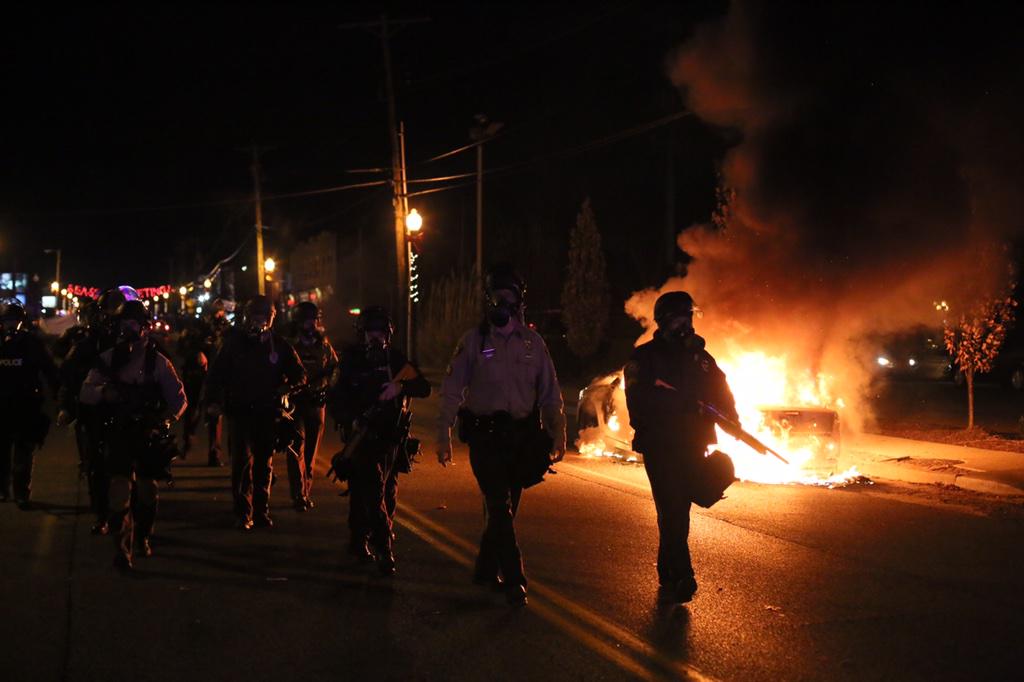Burning Down Cities
"I'm in such an emotional state of mind right now, I've been crying all morning. It's like a grieving process. This is my livelihood, this is the only income I have to raise my children. If business stops coming in here, then I can't be who I'm supposed to be -- a mom to them."
Natalie DuBose, bakery shop owner, Ferguson, Missouri
"It's heartbreaking -- a community I've grown up in, lived in all my life. I've never seen this kind of unrest, this kind of frustration played out in any way, much less in this violent manner, with destruction of businesses in our community."
James Knowles, mayor, Ferguson, Missouri
"This is how the grand jury is supposed to be used. The resources that were put into this grand jury -- to really uncover what happened rather than just put up enough evidence to get a charge -- if we did that in every case you would see a lot fewer cases being brought, stronger cases being brought and a lot fewer wrongful convictions. I wish they handled a grand jury like this in every case."
"You don't have a right as a citizen to resist with force a police officer. And so if this guy put his hand on the door and shoved the door closed so Officer Wilson couldn't get out, punched Officer Wilson, he's now guilty of a second felony -- forget the felony he committed back at the grocery store. Under Tennessee v Garner, if Officer Wilson had probable cause to believe that Brown posed a serious threat to Officer Wilson or to others, he could legally shoot him as he fled."
"Police officers are not boxers. They are not paid to fight. If somebody comes at them, the officer has a gun, his job is not to let that person take his gun. [Police] are not permitted to fire warning shots and to shoot to injure. If you are legally justified to use deadly force, you shoot centre mass until there is no longer a threat."
Mark Schamel, lawyer, specializing in police shootings, Washington
 |
| Photo: Hu Mach, Ferguson, police walk by second burning police cruiser, 25 November 2014 |
The death of a young black man is also heartbreaking. Certainly his bereaved parents and his community are broken-hearted. And they were looking for someone on whom their grief could be fixed, the man who shot 18-year-old unarmed black teen, Michael Brown. A white policeman, fearful for his own safety, who responded to his fear by shooting Michael Brown repeatedly, killing him.
Darren Wilson's head was wanted by the black community from Ferguson, right across the U.S.
But that head was denied the angry public. Instead a grand jury that had deliberated for months, looking through reams of documentation, interviewing witnesses and communing between themselves, ten whites and four blacks, representative of the mix in the Missouri city, concluded that Police officer Darren Wilson did his duty. He could be reproached for doing his duty too well, but he did do that, even at the price of a life.
He had stopped two black teens, walking down the middle of a road, while in his police vehicle. He thought the description of two men who had just robbed a convenience store matched those he had confronted who refused his request to get off the road onto the sidewalk. As he began to emerge from the police vehicle, the larger of the two teens, standing over six feet, five inches in height and weighing 300 pounds, shoved the door closed.
He leaned into the window and began pummelling the police officer's head. When Officer Wilson drew his gun, Michael Brown grabbed it, to turn the muzzle toward thepolice officer. Who was able to regain control and fire a shot striking the young man's hand. As he turned and ran the police officer ran after him, shouting for him to stop. But Michael Brown turned on Officer Wilson. One witness described the officer being "charged".
Which is when Officer Wilson fired several times, killing the teenager with a shot to the head. Forensic evidence has found Michael Brown's DNA on the gun and on the officer's clothing. Close examination and interviews appear to validate Police Officer Wilson's recounting of what had occurred. He is now surely the most hated man in America. And without doubt his life is in danger. He probably thinks he would have done anything to be somewhere else that fateful day.
That day, months on, now sees Ferguson in violent turmoil. Not only are its black citizens, and white too, without doubt, angry, at the symbolism of yet another young black man shot dead by police, but thugs who always take advantage of such civil strife arrive in their numbers to wreak havoc, partying by destroying public and private propety alike, looting and setting fire to buildings, creating an utter, frightening shambles of civility.
"They are just ignorant people who took advantage of an opportunity; they don't have anything to do with us", Carmen Ross, 32, a music student living nearby stated. "That's just sad because now you have us black people represented as a bunch of hooligans burning down cities."
Labels: Social Failures, United States
0 Comments:
Post a Comment
<< Home